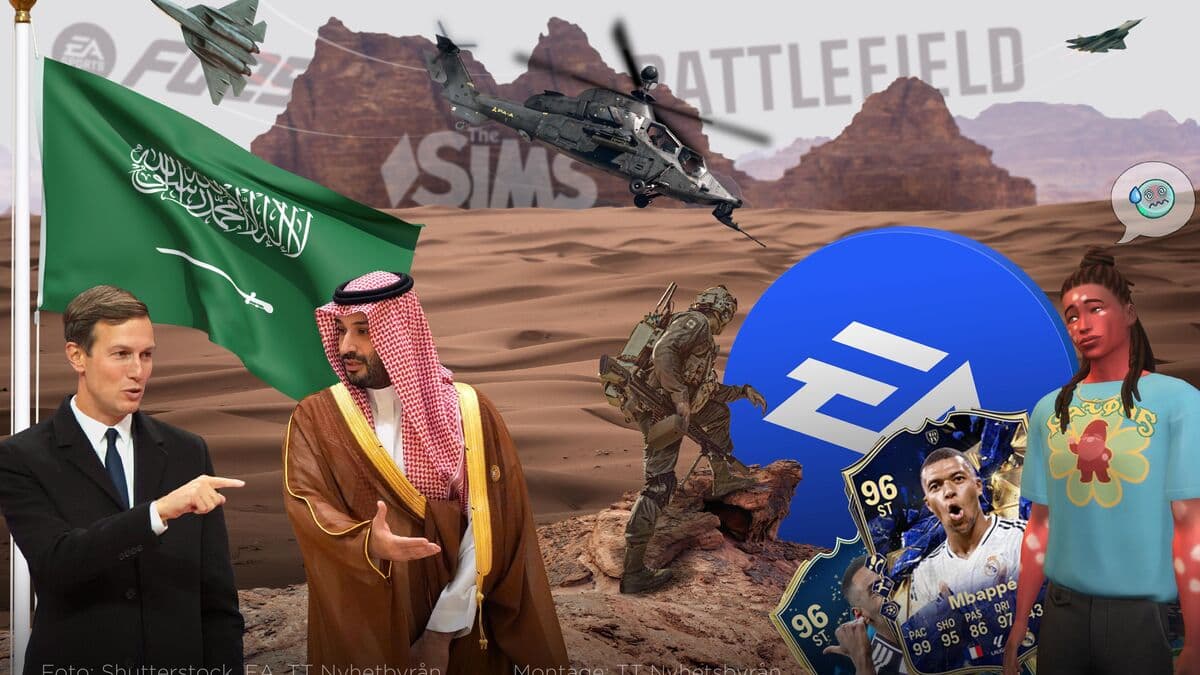The acquisition of Electronic Arts is one of the largest from the American stock exchange. Behind it stands a trio with the state-owned Saudi investment company PIF at the forefront.
Saudi Arabia wants to reduce its oil dependence.
They utilize their seemingly endless capital resources to take a more prominent role in the global economy, says Joost van Dreunen, professor at New York University Stern.
The gaming industry has stagnated after the boost during the pandemic. The premium on EA's stock is 25 percent and the price tag is close to 30 times the operating profit.
So paying $55 billion for EA is on paper irrational.
Want to be in the middle
The explanation is a Saudi aspiration to become a cultural hub with investments in sports, tech, and entertainment.
It's a way for Saudi Arabia to shine the spotlight on itself by associating with brands, activities, and entertainment that people like.
The gaming giant owns a long list of titles such as "The Sims", "Battlefield", "EA Sports FC", and "Dragon Age".
EA ticks many boxes for the Saudis; tech company, entertainment, brands, sports connection. It's against that background that they are willing to overpay.
Risk of self-censorship
What happens then to the games and the companies that make them – including the Swedish "Battlefield" creators Dice? Joost van Dreunen guesses that some leadership will be encouraged to move to Saudi Arabia, which may not appeal to everyone.
The country takes human rights lightly – parties are banned, women are discriminated against, guest workers are lawless, and the death penalty is used to silence dissenters, according to Amnesty.
I think (the Saudis) will want to influence the content that is actually in the games.
Will "The Sims" continue to allow same-sex marriages and will the Saudis be portrayed as "the good guys" in the next "Battlefield"? There is an obvious risk of self-censorship, according to Joost van Dreunen.
This will be part of a larger discussion about how a foreign investment fund can influence Western media and entertainment.
He guesses, however, that PIF will sell some game rights and focus on sports games. Maybe the purchase will also be a boost for the gaming world. Without Wall Street's eyes, maybe inspiration can flow, and the hunger for money can be toned down.
If an owner has sufficient resources, they can do very interesting things, says van Dreunen and continues:
I hope they take advantage of it, refine and invest in research and development.
On September 29, the American gaming giant EA announced that the company wants to be acquired by a consortium of the state-owned Saudi investment fund PIF, the American investment companies Silver Lake and Affinity Partners. Affinity Partners is owned by Jared Kushner, son-in-law of US President Donald Trump.
The purchase price is $55 billion (517 billion kronor) and represented a premium of 25 percent of the stock price on September 25. The deal is expected to be completed during the second quarter of next year.
The acquisition from the New York Stock Exchange is described as the largest cash transaction carried out.
The gaming company EA is behind sports games such as "EA Sports FC" (formerly Fifa), "The Sims", "Apex Legends", and "Battlefield" and has also released Josef Fares' games such as "It takes two" and "Split fiction". The company has 23 studios around the world and around 14,500 employees. The company had a turnover of $7.5 billion in the fiscal year 2025.
Sources: EA, Bloomberg.
Saudi Arabia has, through the state-owned investment fund PIF, invested in golf and tennis, but also has a history of investments in games. For example, they are a major owner of Nintendo, the Swedish company Embracer, Take-Two, Activision Blizzard, Capcom, and Nexon. The subsidiary Savvy Games acquired the mobile game company Scopely in 2023, which in turn acquired the "Pokémon Go" creators Niantic last year.
In August, Saudi Arabia hosted the Esports World Cup, with football star Cristiano Ronaldo as a prize presenter, three million visitors, and $70 million in prize money.
PIF is also said to have paid Ubisoft to create a game add-on to "Assassin's Creed Mirage" set in the Saudi city of al-Ula, which was released for free in August.
Sources: IGN, Gamespot, The Conversation, Esports World Cup.






